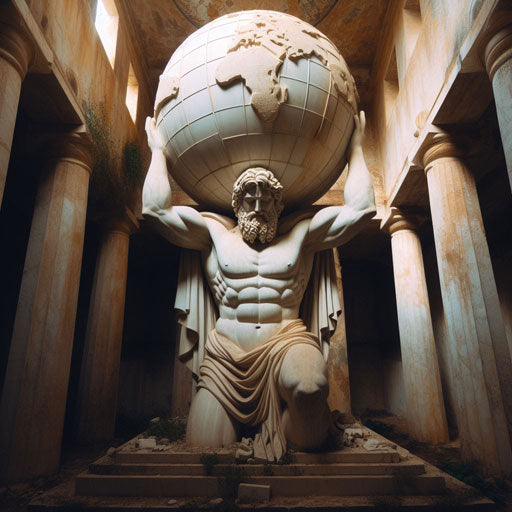Unveiling the Titans: Exploring the Mythical Origins of Greek Mythology's Primordial Deities
Introduction:
In the vast tapestry of Greek mythology, the Titans stand as towering figures, representing the primordial forces that shaped the cosmos. Their stories are woven with intrigue, power struggles, and divine conflict, laying the groundwork for the rise of the Olympian gods. Join us as we embark on a journey to unravel the mysteries of these ancient beings and delve into their timeless significance.
Section List:
- Unearthing the Titans: Origins and Genealogy
- The Titanomachy: The War of the Titans
- Titans in Mythology and Culture
- The Most Famous Titans
- Fascinating Facts About the Titans
- Conclusion
Unearthing the Titans: Origins and Genealogy
The Titans trace their lineage back to Gaia (Earth) and Uranus (Sky), the primordial deities who birthed them into existence. From Cronus (Saturn) to Rhea, Oceanus, and Hyperion, each Titan embodies different aspects of the natural world, reflecting the majesty and complexity of creation itself.
The Titanomachy: The War of the Titans
The Titanomachy, the epic war between the Titans and the Olympian gods, is a pivotal moment in Greek mythology. It was a clash of titanic proportions, marked by fierce battles and divine intervention. Heroes emerged, alliances were forged, and the fate of the cosmos hung in the balance as the Titans fought to maintain their dominion.

Titans in Mythology and Culture
Despite their defeat and subsequent imprisonment in Tartarus, the Titans remain a potent force in Greek mythology. Their stories have been immortalized in art, literature, and popular culture, inspiring countless interpretations and adaptations. From classical sculptures to modern reimaginings, the Titans continue to captivate our imaginations with their enduring legacy.
The Most Famous Titans
Explore the most prominent Titans in Greek mythology, including:
- Cronus (Saturn): The ruler of the Titans and father of the Olympian gods, known for devouring his children to prevent them from overthrowing him.
- Rhea: Cronus' sister and wife, who managed to save her son Zeus from his father's fate.
- Oceanus: The Titan of the ocean, believed to encircle the world with his mighty river.
- Hyperion: The Titan of light, often associated with the sun and celestial bodies.
- Mnemosyne: The Titaness of memory, who bore the nine Muses with Zeus.
- Tethys: Oceanus' wife and the mother of the river gods and Oceanids.
- Themis: The Titaness of divine law and order, often associated with prophecy and oracles.
- Crius (Krios): Often considered the Titan of constellations and heavenly bodies.
- Iapetus: Father of Prometheus, Epimetheus, Atlas, and Menoetius.
- Coeus (Koios): Associated with intellect and the axis of heaven.
- Phoebe: Often associated with the moon and prophecy, and grandmother of Apollo and Artemis.
- Thea: Mother of Helios (Sun), Selene (Moon), and Eos (Dawn).
- Atlas: Condemned to hold up the heavens on his shoulders as punishment for his role in the Titanomachy.
- Prometheus: Known for creating humanity and stealing fire from the gods to give to mankind.
- Epimetheus: Brother of Prometheus and husband of Pandora, responsible for accepting her as a gift from the gods.
- Metis: Titaness of wisdom and the first wife of Zeus, who later gave birth to Athena.
- Ananke: Represented as the personification of necessity, fate, and destiny.
- Helios: The Titan personification of the sun.
- Selene: The Titaness personification of the moon.
- Eos: The Titaness personification of the dawn.

Titan Prometheus: Known for creating humanity and stealing fire from the gods to give to mankind.
Fascinating Facts About the Titans
Delve deeper into the world of Greek mythology with these intriguing tidbits about the Titans:
1. Titanic Offspring: The Titans were known for their prolific offspring, who often played significant roles in Greek mythology. For example, Atlas, one of the Titans, was the father of the Hesperides and the Hyades.
2. Titanic Punishments: Some Titans faced severe punishments for their actions. For instance, Atlas was condemned to hold up the heavens on his shoulders for eternity, a task often depicted in art and literature. Similarly, Prometheus, for his act of stealing fire from the gods to give to humanity, was bound to a rock where an eagle would eat his liver daily, only for it to regenerate and be eaten again the next day as a perpetual punishment.
3. Cyclical Power: The conflict between the Titans and the Olympian gods symbolizes the cyclical nature of power and authority in Greek mythology, with the younger generation overthrowing the old order to establish their dominance.
4. Titanic Influence: The Titans' influence extended beyond Greek mythology and into other cultures. Many ancient civilizations, including the Romans, Egyptians, and Norse, incorporated Titan-like figures into their own mythologies.
5. Cosmic Roles: Each Titan represented different aspects of the natural world, from the earth and sky to the sun and moon. Their roles and domains were interconnected, reflecting the interconnectedness of the cosmos itself.
6. Titanic Symbolism: The Titans serve as powerful symbols in Greek mythology, representing primordial forces, cosmic order, and the eternal struggle between chaos and harmony.
7. Modern Resonance: The stories of the Titans continue to resonate in modern culture, inspiring countless adaptations in literature, film, and popular media. Their timeless themes of power, destiny, and rebellion captivate audiences to this day.
Conclusion:
The Titans stand as timeless symbols of the ancient world's grandeur and complexity, their stories woven into the fabric of Greek mythology. From their mythical origins to their epic clashes with the Olympian gods, the Titans captivate our imaginations with their enduring legacy. As we explore their tales of power, rebellion, and cosmic significance, we gain insights into the human condition and our place in the universe. Though relegated to the annals of history, the Titans continue to inspire awe and wonder, reminding us of the enduring power of myth and the eternal quest for understanding.
Explore these fascinating facts to gain a deeper appreciation for the enduring legacy of the Titans in Greek mythology and beyond.
See more interesting posts here

